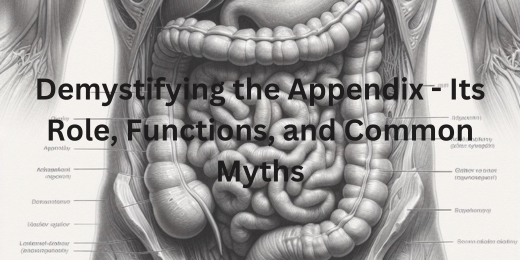The role of the appendix
The appendix is a small, finger-shaped pouch located at the lower right side of the abdomen. While often considered insignificant, it has garnered attention due to its mysterious nature. This enigmatic organ is part of the digestive system, situated near the junction of the small and large intestines.
Despite its modest size, understanding the role of the appendix is essential for appreciating its place in our physiology. It’s like a quiet observer in the complex orchestra of our body’s functions.
Historically, it was thought to be vestigial, with no significant purpose. However, recent studies suggest it might play a role in immune function and gut health. Though not vital for survival, the appendix remains an intriguing topic in the realm of human anatomy and physiology. The role of the olfactory system, much like the appendix, showcases how our understanding of seemingly insignificant anatomical features can evolve over time, revealing hidden functions that contribute to our overall understanding of human biology.
Anatomy and Structure of the Appendix
The appendix is a tiny, tube-shaped organ that is connected to the big intestine. It’s located at the lower right side of the abdomen, resembling a finger-like pouch. This seemingly unassuming organ plays a part in our digestive system.
Its structure consists of lymphatic tissue, which is a vital component of our immune system. Despite its small size, the role of the appendix has intrigued medical professionals and researchers for years. It’s like a quiet sentinel, contributing to our body’s overall health. Its exact function, however, has been a subject of debate.
Some believe it aids in immune response, while others argue its significance remains largely elusive. Regardless, understanding the anatomy and placement of this unique organ is key to appreciating its potential contributions to our overall well-being. Just as the role of the appendix remains debated, tonsils’ significance in the immune system is also a subject of discussion, emphasizing the importance of understanding their function and placement in our overall well-being.
Functions of the Appendix
The appendix has long been considered a mysterious organ in the human body, with its precise function eluding full comprehension. However, recent research has shed light on the role of the appendix. While not essential for survival, it appears to have a role in the immune system.
It contains lymphatic tissue, which plays a crucial role in the body’s immune responses. This suggests that the appendix might act as a sort of “safe house” for beneficial gut bacteria, helping to restore the microbiome after illnesses that deplete it. In this way, it contributes to maintaining a healthy gut and overall well-being.
Moreover, some studies indicate that the appendix could serve as a reservoir of immune cells, aiding in the body’s defence against infections. While not fully understood, these potential functions underscore that the appendix isn’t merely a vestigial remnant but has a role in our immune system. Much like the potential immune role of the appendix, the spleen’s role in filtering and storing blood components underscores how seemingly secondary organs can play intricate roles in maintaining our overall health and immunity.
Common Myths and Misconceptions
Common misconceptions often shroud the role of the appendix in mystery. It’s commonly believed to be a vestigial organ, a remnant of our evolutionary past with no significant function. However, recent studies have challenged this notion. The appendix is not a redundant structure; rather, it appears to contribute to our immune system.
Another myth is that the appendix serves no purpose and its removal has no consequences. While it’s true that people can lead healthy lives after an appendectomy, studies suggest that it might have subtle impacts on gut health and immune function. Additionally, there’s a belief that appendicitis is solely caused by a blockage in the appendix.
While this is a common trigger, infections and other factors can also lead to this condition. Thus, understanding the role of the appendix goes beyond dispelling myths; it’s about appreciating its potential contributions to our health. Similarly understanding the essential role of the parathyroid gland in calcium regulation underscores the complexity of our body’s various systems and their impact on overall well-being.
Appendicitis: A Critical Concern
Appendicitis is a condition involving inflammation of the appendix, and it can be a critical concern. It’s like a ticking time bomb in the abdomen. When the appendix becomes blocked or infected, it can lead to severe pain, fever, and potential complications if left untreated. Prompt medical attention is crucial when symptoms arise.
Delaying treatment can result in the appendix rupturing, which releases harmful bacteria into the abdominal cavity, leading to a potentially life-threatening infection. Therefore, recognising the signs of appendicitis is vital. Common symptoms include abdominal pain, especially in the lower right side, loss of appetite, nausea, vomiting, and fever.
If you or someone you know experiences these symptoms, seeking medical help promptly is essential. Surgery to remove the appendix, known as an appendectomy, is typically the recommended treatment. This procedure can prevent the condition from escalating and ensure a full recovery.
Conclusion: Appreciating the Appendix’s Significance
In conclusion, understanding the role of the appendix is crucial for appreciating its significance in our physiology. This small organ, once thought to be vestigial, has revealed itself as an essential part of our immune system. Its location near the junction of the small and large intestines signifies its potential importance.
While not vital for survival, the appendix contributes to our overall well-being. Recognising common misconceptions about this organ, such as its presumed lack of purpose, is key to appreciating its true value. Additionally, being aware of the risks associated with appendicitis and seeking prompt medical attention when symptoms arise is crucial.
By acknowledging the potential contributions of the appendix, we gain a deeper understanding of our own bodies. It’s like unlocking a hidden treasure in the realm of human anatomy. Therefore, appreciating this often-misunderstood organ is an important step towards a more comprehensive grasp of our physiological functions.


